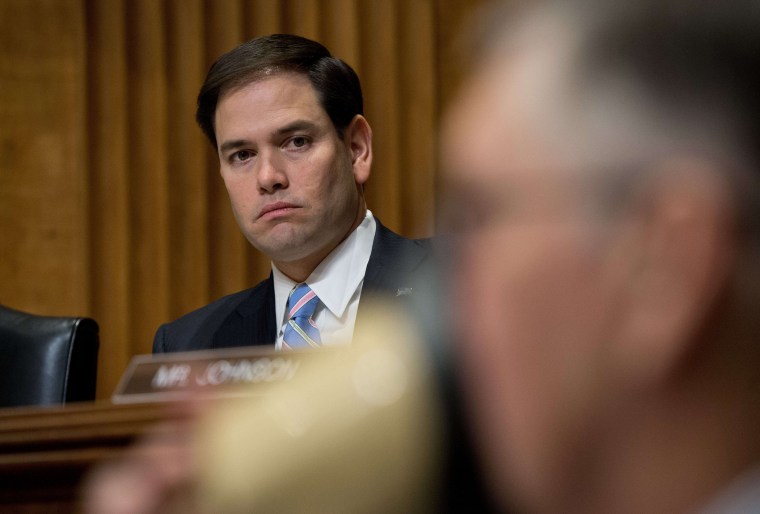Sen. Marco Rubio (R-Fla.) generated quite a few headlines in his interview with NPR's Steve Inskeep this week, but not necessarily for the right reasons.
The story that got tongues wagging inside the Beltway was hard to miss: the conservative senator dismissed former Secretary of State Hillary Clinton's presidential future, arguing the nation is at a "generational, transformational crossroads," and Clinton is "a 20th century candidate."
Maybe it's just me, but hearing a far-right lawmaker who opposes marriage equality, supports limits on contraception access, opposes reproductive rights, balks at ENDA, and fails to believe in climate science turn around and present himself as a forward-thinking leader for the future is a bit much. As Barbara Morrill joked, Rubio's "the guy for a generational, transformational change. Assuming you're talking about a transformation back to the 19th century."
But just as interesting were the senator's comments about comprehensive immigration reform, which Rubio co-sponsored in the Senate, which passed a bill fairly easily last year.
"I've been through this now, I was involved in the effort. I warned during that effort that I didn't think it did enough on this first element, the [border] security front. I was proven, unfortunately, right by the fact that it didn't move in the House."
As the senator probably knows, this assessment doesn't line up especially well with what's actually transpired.
As Rubio now sees it, immigration reform died because the Senate bill -- which is to say, Rubio's bill -- came up short on border security. We know this is wrong. To shore up GOP support in the upper chamber, the bill's bipartisan sponsors agreed to a "border surge" that would nearly double the "current border patrol force to 40,000 agents from 21,000, as well as for the completion of 700 miles of fence on the nation's southern border."
It took border security so seriously that some reform proponents wavered, fearing it went too far in militarizing the border. One GOP senator conceded at the time that the legislation went so far on the security front that it was "almost overkill."
Rubio now says he was right all along, warning senators that the bill wasn't tough enough. But that's plainly silly. Indeed, as Simon Maloy discovered, Rubio actually praised his bill's security provisions at the time, boasting that it "mandates the most ambitious border and interior security measures in our nation's history."
So why did the House Republicans kill it anyway? Because the comprehensive solution required them to compromise, accepting a pathway to citizenship for undocumented immigrants already in the United States. House GOP lawmakers refused to strike a deal -- hell, they refused to even go to the negotiating table -- so the legislation died, again.
The related question is, why would Rubio make such obviously untrue claims now? The answer, I suspect, is that the Florida Republican took a sharp hit from his party's far-right base for supporting immigration reform, and as Rubio looks ahead to the 2016 race, the senator needs a way to distance himself from his own legislative handiwork.
This, apparently, is the argument he's come up with. If you're thinking the talking points aren't going to persuade anyone, you're not alone.
